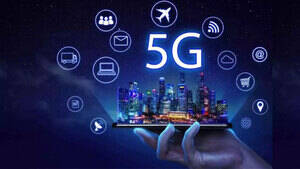Describing the 5G technology and its impact on society
5G technology represents a transformative leap in connectivity that promises to reshape society in profound ways.

In the ever-evolving landscape of 5G technology, one term has been making waves in recent years:
The fifth generation of wireless technology promises not just faster internet speeds, but a seismic shift in the way we connect, communicate, and interact with the world around us.
In this blog post, we will delve into the concept of 5G technology and explore its potential impact on society.
Understanding 5G Technology
Before we dive into its societal implications, let's start by understanding what 5G technology is all about. At its core, 5G stands for the fifth generation of mobile networks. It builds upon the foundation laid by its predecessors, 2G, 3G, and 4G, but takes connectivity to a whole new level.
- Speed and Bandwidth: The most striking feature of 5G is its remarkable speed. While 4G offers speeds of up to 100 Mbps, 5G can deliver a staggering 1-10 Gbps. This dramatic increase in speed is achieved through the use of higher frequency radio waves and advanced antenna technologies, allowing for much greater data transfer rates.
- Low Latency: 5G boasts significantly reduced latency, the time it takes for data to travel from sender to receiver. While 4G typically has a latency of 30-50 milliseconds, 5G can achieve as low as 1 millisecond. This near-instantaneous response time is a game-changer, especially for applications that require real-time communication, such as autonomous vehicles and remote surgery.
- Massive Device Connectivity: 5G can support a massive number of connected devices simultaneously. With the Internet of Things (IoT) on the rise, this capability is essential.
- Network Slicing: This is a unique feature of 5G that allows network operators to create multiple virtual networks on a single physical infrastructure. Each "slice" can be customized to meet the specific needs of different applications, ensuring optimal performance for everything from augmented reality (AR) to industrial automation.
Potential Impact on Society
Now that we have a grasp of what 5G technology entails, let's explore its potential impact on society. The deployment of 5G networks is set to usher in a new era of connectivity that will touch nearly every aspect of our lives.
- Revolutionizing Healthcare:With its low latency and high-speed capabilities, 5G is poised to revolutionize healthcare. Doctors can perform remote surgeries with unprecedented precision, enabled by real-time communication and robotic assistance.
- Enhancing Education:The COVID-19 pandemic highlighted the importance of reliable internet access for education. 5G can bridge the digital divide by providing high-speed internet to underserved areas. Additionally, it can enable immersive learning experiences through virtual and augmented reality, bringing lessons to life in ways previously unimaginable.
- Transforming Transportation:Autonomous vehicles (AVs) are inching closer to becoming a reality, and 5G is a critical enabler. The low latency of 5G ensures split-second decision-making for AVs, making roads safer and traffic more efficient. Moreover, connected transportation systems can reduce congestion and emissions, leading to more sustainable and eco-friendly cities.
- Empowering Smart Cities:5G is the linchpin of smart cities, where data-driven technologies enhance urban living. Smart traffic lights, waste management, and energy grids can optimize resource allocation and reduce environmental impact. Citizens can also enjoy improved public services, from public safety to efficient public transportation.
- Enabling Industry 4.0:The manufacturing industry is undergoing a transformation known as Industry 4.0, marked by automation and data exchange. 5G's capacity for handling massive device connectivity and network slicing is ideal for the complex machinery and sensors required in this new era of manufacturing. It can increase efficiency, reduce downtime, and enhance product quality.
- Entertainment and Media:5G is set to elevate the entertainment industry. Streaming high-definition and even 4K or 8K content on mobile devices will become seamless. Augmented and virtual reality experiences will also become more immersive, opening up new possibilities for gaming, sports, and entertainment.
- Agriculture and Rural Connectivity:Rural areas have often struggled with slow or unreliable internet access. 5G can bridge this digital divide, enabling farmers to use IoT devices and precision agriculture techniques to improve crop yields and reduce resource usage.
- Environmental Monitoring:5G's low-power IoT capabilities make it ideal for environmental monitoring.
Challenges and Considerations
While the potential benefits of 5G technology are vast, it's essential to address some of the challenges and considerations associated with its deployment:
- Infrastructure Investment: The rollout of 5G networks requires significant infrastructure investment, including the installation of numerous small cell towers. This can be costly and may face opposition from some communities due to aesthetic and health concerns.
- Security and Privacy: As the number of connected devices increases, so does the potential attack surface for cybercriminals. Ensuring robust security measures and protecting user privacy will be critical.
- Regulatory and Spectrum Challenges: The allocation of spectrum for 5G networks and regulatory frameworks must evolve to accommodate the unique needs of this technology.
- Digital Inclusion: While 5G has the potential to bring high-speed internet to underserved areas, ensuring equitable access for all remains a challenge. Bridging the digital divide is crucial to harnessing the full societal benefits of 5G.
In conclusion, 5G technology represents a transformative leap in connectivity that promises to reshape society in profound ways.
What's Your Reaction?
















